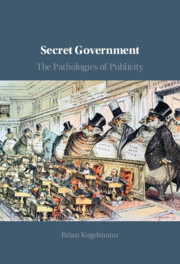6 results
Chapter 2 - Electoral Things
-
- Book:
- The Electoral Imagination
- Published online:
- 26 September 2022
- Print publication:
- 13 October 2022, pp 88-161
-
- Chapter
- Export citation
Chapter 2 - Democracy Thrives in Darkness
-
- Book:
- Secret Government
- Published online:
- 04 November 2021
- Print publication:
- 11 November 2021, pp 35-63
-
- Chapter
- Export citation
Introduction
-
- Book:
- Secret Government
- Published online:
- 04 November 2021
- Print publication:
- 11 November 2021, pp 1-10
-
- Chapter
- Export citation

Secret Government
- The Pathologies of Publicity
-
- Published online:
- 04 November 2021
- Print publication:
- 11 November 2021
4 - Mobilization
-
- Book:
- The Roman Republic to 49 BCE
- Published online:
- 22 June 2021
- Print publication:
- 06 May 2021, pp 162-202
-
- Chapter
- Export citation
2 - Challenges for Electoral Clientelism
- from Part I - Electoral Clientelism
-
- Book:
- Votes for Survival
- Published online:
- 06 December 2018
- Print publication:
- 15 November 2018, pp 27-66
-
- Chapter
- Export citation

